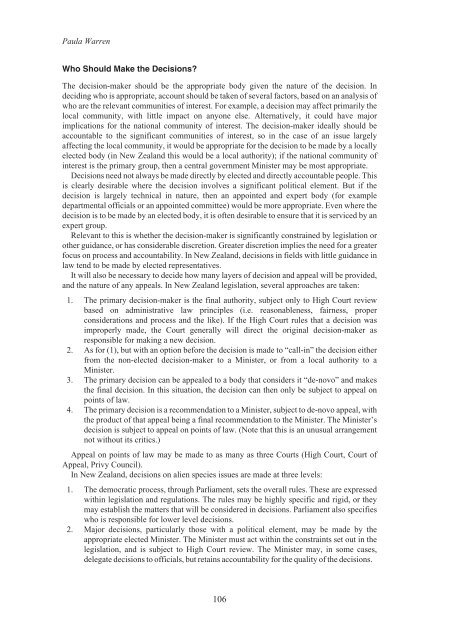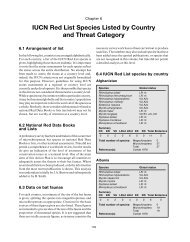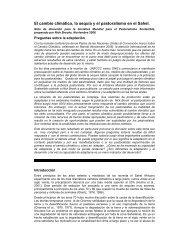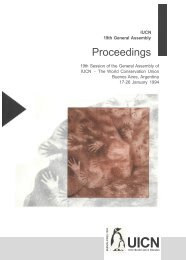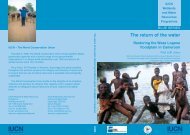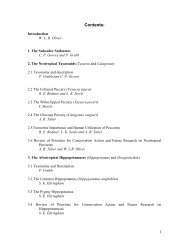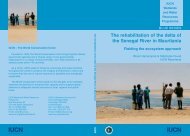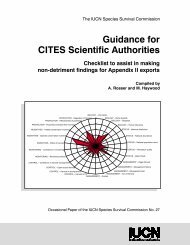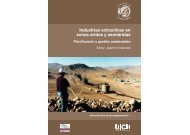Alien Species.vp - IUCN
Alien Species.vp - IUCN
Alien Species.vp - IUCN
Create successful ePaper yourself
Turn your PDF publications into a flip-book with our unique Google optimized e-Paper software.
Paula Warren<br />
Who Should Make the Decisions?<br />
The decision-maker should be the appropriate body given the nature of the decision. In<br />
deciding who is appropriate, account should be taken of several factors, based on an analysis of<br />
who are the relevant communities of interest. For example, a decision may affect primarily the<br />
local community, with little impact on anyone else. Alternatively, it could have major<br />
implications for the national community of interest. The decision-maker ideally should be<br />
accountable to the significant communities of interest, so in the case of an issue largely<br />
affecting the local community, it would be appropriate for the decision to be made by a locally<br />
elected body (in New Zealand this would be a local authority); if the national community of<br />
interest is the primary group, then a central government Minister may be most appropriate.<br />
Decisions need not always be made directly by elected and directly accountable people. This<br />
is clearly desirable where the decision involves a significant political element. But if the<br />
decision is largely technical in nature, then an appointed and expert body (for example<br />
departmental officials or an appointed committee) would be more appropriate. Even where the<br />
decision is to be made by an elected body, it is often desirable to ensure that it is serviced by an<br />
expert group.<br />
Relevant to this is whether the decision-maker is significantly constrained by legislation or<br />
other guidance, or has considerable discretion. Greater discretion implies the need for a greater<br />
focus on process and accountability. In New Zealand, decisions in fields with little guidance in<br />
law tend to be made by elected representatives.<br />
It will also be necessary to decide how many layers of decision and appeal will be provided,<br />
and the nature of any appeals. In New Zealand legislation, several approaches are taken:<br />
1. The primary decision-maker is the final authority, subject only to High Court review<br />
based on administrative law principles (i.e. reasonableness, fairness, proper<br />
considerations and process and the like). If the High Court rules that a decision was<br />
improperly made, the Court generally will direct the original decision-maker as<br />
responsible for making a new decision.<br />
2. As for (1), but with an option before the decision is made to “call-in” the decision either<br />
from the non-elected decision-maker to a Minister, or from a local authority to a<br />
Minister.<br />
3. The primary decision can be appealed to a body that considers it “de-novo” and makes<br />
the final decision. In this situation, the decision can then only be subject to appeal on<br />
points of law.<br />
4. The primary decision is a recommendation to a Minister, subject to de-novo appeal, with<br />
the product of that appeal being a final recommendation to the Minister. The Minister’s<br />
decision is subject to appeal on points of law. (Note that this is an unusual arrangement<br />
not without its critics.)<br />
Appeal on points of law may be made to as many as three Courts (High Court, Court of<br />
Appeal, Privy Council).<br />
In New Zealand, decisions on alien species issues are made at three levels:<br />
1. The democratic process, through Parliament, sets the overall rules. These are expressed<br />
within legislation and regulations. The rules may be highly specific and rigid, or they<br />
may establish the matters that will be considered in decisions. Parliament also specifies<br />
who is responsible for lower level decisions.<br />
2. Major decisions, particularly those with a political element, may be made by the<br />
appropriate elected Minister. The Minister must act within the constraints set out in the<br />
legislation, and is subject to High Court review. The Minister may, in some cases,<br />
delegate decisions to officials, but retains accountability for the quality of the decisions.<br />
106


